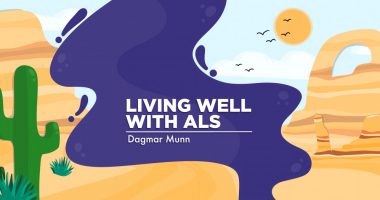Fighting the Predictable Unpredictability of Rare Disease

“Will you still need me, will you still feed me,
When I’m sixty-four”
Paul McCartney wrote the song “When I’m Sixty-Four” four decades before reaching that age himself. McCartney admitted that the number was chosen arbitrarily. He later quipped during an interview that 65 would have been a more prudent selection: “The rhyme would have been easy.”
I first heard the lyrics at 9 years old. The age of 64 was a long way off. The oldest people that I knew — two of my grandparents — were 67, and in my eyes they were ancient. It was impossible to project myself that far into the future. There were so many bridges to cross.
Of course, with each passing milestone, the ability to envision my existence at three score plus four years sharpened. Nothing was guaranteed — two of McCartney’s bandmates didn’t reach that longevity threshold — but with near certainty I could answer the questions posed in the song’s refrain. Absolutely I’d be needed. And I wouldn’t fret over who fed me, I’d take care of that effortless task.
Eleven days shy of my 49th birthday, I was delivered the news that I had ALS. Suddenly, any thought of reaching age 64 was summarily dismissed. Given the disease’s randomness, unpredictability, and potential to advance aggressively, I wondered if a 50th birthday party would be forthcoming.
Indeed, I did make the half-century mark. ALS allowed me that. But ever since its onslaught commenced, it has rendered me increasingly unnecessary, and has gradually eroded my ability to self-nourish.
Against long odds, several weeks ago I turned 64. McCartney draws a minimalist lyrical portrait of life at that age: “I could be handy, mending a fuse,” “Sunday mornings go for a ride,” “Doing the garden, digging the weeds.” But all ceased being viable options for me to pursue long ago. The only time I’ve been out of the house at “quarter to three” in the morning in my ALS era was when I was hospitalized.
The reminder of my inability to engage in the simplest aspects of life hurt. But the answers to McCartney’s questions stung considerably more. I am completely unnecessary. Without copious assistance, I’d starve.
Toward the end of the classic, McCartney signs off in melodramatic fashion: “Yours sincerely, wasting away.” In the days leading up to my birthday, and certainly for a good portion of the day itself, that’s precisely how I felt.
My body has had a difficult 2022 thus far. On the heels of a protracted pressure sore outbreak, I developed a nasty urinary tract infection. The combination left me in pain from all points south of my waistline, while leaving a repulsive oleo of blood and urine in the wake of every transfer.
I am blessed to have a talented medical team that makes house calls. However, the confluence of so many folks tending to my intersecting maladies was both comforting and disconcerting. The expert attention is enormously appreciated, but the sidebar sympathetic comments regarding my condition were unpleasantly brainwashing.
I have been in denial about the hopelessness of my circumstance for its duration. Similarly, I have not inordinately fretted over my ever-growing associated helplessness at many defining junctures. The barrage of commentary, confirming the futility of my situation, burst my bubble with a sonic boom.
Add to that the obvious ALS fatigue that my family is forced to endure, and my existence is not merely unnecessary, it is deleterious. I’ve begun to wonder, when did enthusiastic desire for my inclusion become measured tolerance? When did affection toward me become a chore? ALS is a fiendish serial killer, but the collateral damage it inflicts on a victim’s loved ones can be hideously scandalous.
That intersection of physical and mental stress deposited me in a malaise I typically tend to avoid. And it was all my fault. I wasn’t prepared.
Rare diseases are notorious for their elusiveness; certainly in terms of a cure, but often also pertaining to origin and trajectory. They are the poster child for unsolvable conundrums and unpredictability.
A musical metaphor is appropriate. Rare Earth was a Michigan-based band that was said to have “defied categorisation.” In the absence of answers, might rare earth be the potting soil for rare disease?
If so, one of Rare Earth’s signature hits, “Get Ready,” is apt: “Well fee fi, fo fo fum/ Look out, baby, ’cause here I come.” I had neglected to remain ready for whatever ALS chose to throw my way.
Without doubt, I have been enormously lucky in terms of ALS’ treatment of me. I momentarily lost sight of my lone, unfailing, comfort-inducing defense mechanism: In my rare disease adventure, Jesus is always by my side.
Note: ALS News Today is strictly a news and information website about the disease. It does not provide medical advice, diagnosis, or treatment. This content is not intended to be a substitute for professional medical advice, diagnosis, or treatment. Always seek the advice of your physician or other qualified health provider with any questions you may have regarding a medical condition. Never disregard professional medical advice or delay in seeking it because of something you have read on this website. The opinions expressed in this column are not those of ALS News Today or its parent company, BioNews, and are intended to spark discussion about issues pertaining to ALS.








Comments